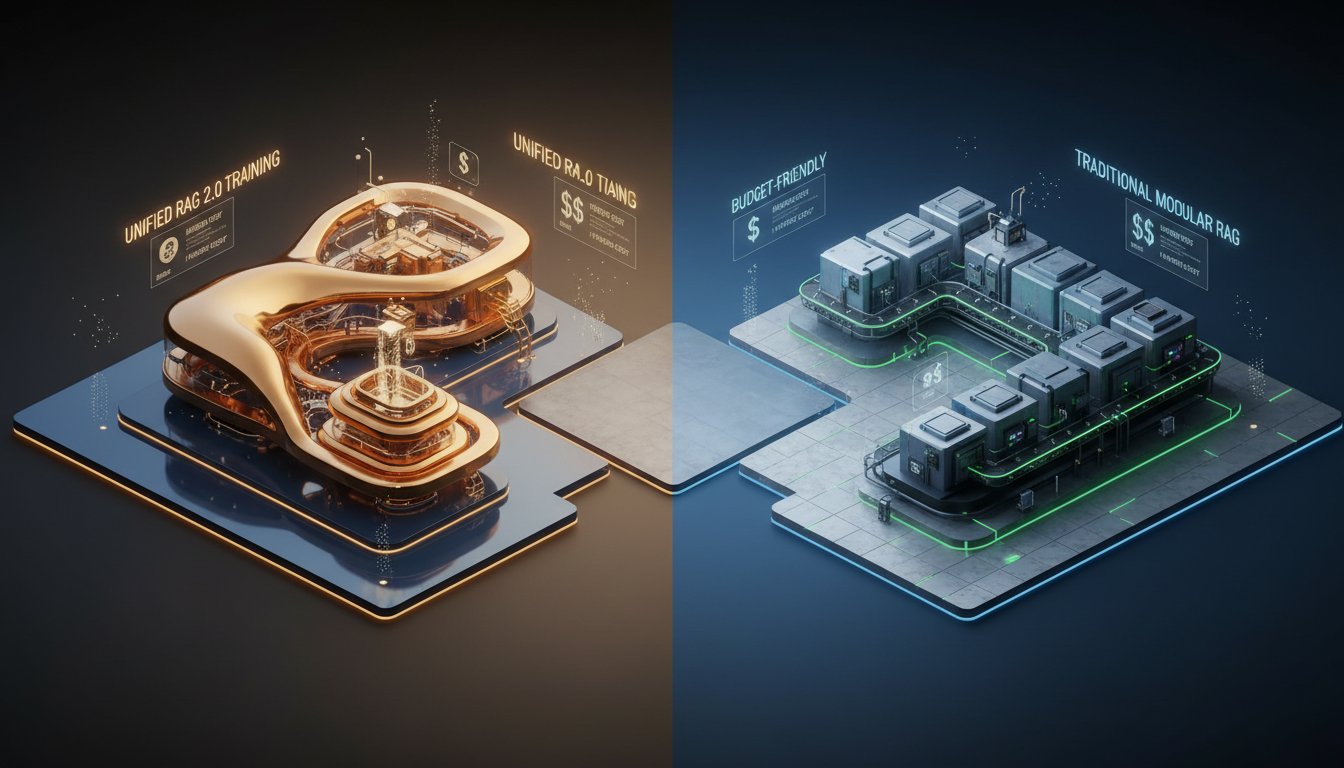The enterprise AI landscape just shifted dramatically. On a seemingly quiet Tuesday in July, Progress Software dropped $50 million to acquire Nuclia, a Barcelona-based startup specializing in agentic RAG-as-a-Service technology. While most of the tech world was focused on the latest LLM announcements, this acquisition signals something far more significant: the enterprise RAG market has officially matured from experimental to mission-critical.
This isn’t just another tech acquisition story. It’s a clear indicator that enterprise organizations are moving beyond proof-of-concept RAG implementations toward production-ready, scalable solutions that can handle real-world business demands. With 80% of enterprise RAG implementations currently failing to reach production, Progress Software’s strategic move represents a blueprint for how enterprises should approach RAG technology in 2025 and beyond.
What makes this acquisition particularly interesting is the focus on “agentic RAG” – a sophisticated evolution of traditional retrieval-augmented generation that incorporates autonomous decision-making capabilities. This technology doesn’t just retrieve and generate; it actively manages workflows, makes contextual decisions, and adapts to enterprise requirements without constant human intervention.
In this analysis, we’ll break down exactly what this acquisition means for enterprise AI strategies, examine the technical capabilities that made Nuclia worth $50 million, and explore how agentic RAG-as-a-Service is positioning itself as the next standard for enterprise AI implementation.
The Strategic Context Behind Progress Software’s Bold Move
Progress Software didn’t stumble into this acquisition by accident. The company has been systematically building its enterprise AI portfolio, and Nuclia represents the missing piece in their end-to-end AI platform strategy. According to Yogesh Gupta, CEO of Progress Software, “The acquisition of Nuclia represents our commitment to extending the end-to-end value of our platform and driving wider adoption of agentic RAG technology.”
This statement reveals a crucial market insight: enterprises aren’t looking for more AI tools – they’re desperate for complete, integrated solutions that eliminate the complexity of building RAG systems from scratch. Progress Software recognized that the current RAG landscape forces enterprises to cobble together solutions from multiple vendors, creating integration nightmares and operational overhead.
The Enterprise RAG Crisis No One Talks About
The timing of this acquisition isn’t coincidental. Recent industry research reveals a stark reality: 80% of enterprise RAG implementations are failing to reach production environments. This failure rate isn’t due to technological limitations – it’s primarily caused by implementation complexity, integration challenges, and the lack of enterprise-grade operational capabilities.
Traditional RAG implementations require enterprises to:
– Manage multiple vendor relationships (vector databases, embedding models, LLMs)
– Handle complex data pipeline orchestration
– Implement custom security and compliance frameworks
– Scale infrastructure manually based on usage patterns
– Maintain specialized AI engineering teams
Nuclia’s approach solves these problems by providing a complete RAG-as-a-Service platform that abstracts away the underlying complexity while maintaining enterprise-grade performance and security standards.
What Made Nuclia Worth $50 Million
Nuclia’s valuation reflects more than just technology – it represents a fundamental shift in how enterprise AI services are delivered. The startup’s core innovation lies in three key areas:
1. Agentic RAG Architecture
Unlike traditional RAG systems that require explicit prompting and manual workflow management, Nuclia’s agentic approach incorporates autonomous decision-making capabilities. The system can automatically:
– Determine optimal retrieval strategies based on query complexity
– Route queries to appropriate knowledge sources
– Adjust response generation parameters based on context
– Learn from user interactions to improve future performance
2. SaaS-First Enterprise Design
Eudald Camprubí, CEO of Nuclia, emphasized this advantage: “Our SaaS product democratizes trustworthy, verifiable GenAI use with minimal upfront investment, beneficial for small to large organizations alike.” This SaaS-first approach eliminates the traditional barriers to RAG adoption, including infrastructure management, scaling challenges, and operational overhead.
3. Trustworthy and Verifiable AI
Perhaps most importantly, Nuclia has solved the trust problem that plagues many enterprise AI implementations. Their system provides:
– Source verification for all generated responses
– Audit trails for compliance requirements
– Content filtering and safety mechanisms
– Transparent reasoning chains for decision-making processes
The Technical Revolution: Understanding Agentic RAG
To fully appreciate the significance of this acquisition, we need to understand what distinguishes agentic RAG from traditional implementations. The evolution from basic RAG to agentic RAG represents a fundamental shift in how AI systems interact with enterprise data and workflows.
Traditional RAG Limitations
Standard RAG systems operate on a simple retrieve-and-generate model:
1. User submits a query
2. System retrieves relevant documents from vector database
3. LLM generates response based on retrieved context
4. System returns response to user
This approach works well for simple question-answering scenarios but breaks down when dealing with complex enterprise workflows that require:
– Multi-step reasoning across different data sources
– Dynamic query reformulation based on initial results
– Contextual awareness of user roles and permissions
– Integration with existing business systems and workflows
The Agentic RAG Advantage
Agentic RAG systems incorporate autonomous agents that can:
Make Strategic Decisions: Instead of blindly retrieving documents, agentic systems analyze query intent and determine optimal search strategies. For example, when a user asks about “Q3 performance metrics,” the system might automatically:
– Identify the user’s department and access permissions
– Determine relevant time periods and metrics
– Access multiple data sources (financial reports, sales data, operational metrics)
– Synthesize information into a comprehensive response
Adapt to Context: Agentic systems maintain context awareness across interactions, enabling more sophisticated workflows. If a user follows up with “How does this compare to last year?”, the system understands the implicit reference and maintains conversation state.
Orchestrate Complex Workflows: Rather than handling single queries, agentic systems can manage multi-step processes that might involve:
– Data validation and quality checks
– Cross-referencing information across systems
– Generating intermediate reports or analyses
– Routing information to appropriate stakeholders
Real-World Implementation Examples
Progress Software’s acquisition of Nuclia enables several powerful enterprise use cases:
1. Intelligent Document Processing
Agentic RAG can automatically process incoming documents, extract relevant information, and route insights to appropriate teams. For example, when processing a new contract, the system might:
– Extract key terms and conditions
– Compare against standard company policies
– Identify potential risks or opportunities
– Generate summary reports for legal and business teams
– Update relevant databases and tracking systems
2. Dynamic Knowledge Management
Unlike static knowledge bases, agentic RAG systems continuously update and refine organizational knowledge. The system can:
– Monitor document changes and updates
– Identify knowledge gaps based on user queries
– Automatically generate new documentation
– Maintain version control and change tracking
3. Personalized Business Intelligence
Agentic systems can provide role-based insights tailored to individual users:
– Sales teams receive competitive analysis and opportunity insights
– Finance teams get automated compliance reports and risk assessments
– Operations teams receive performance metrics and optimization recommendations
– Executive teams get strategic summaries and trend analysis
Market Implications and Competitive Landscape
The Progress Software-Nuclia acquisition sends ripple effects throughout the enterprise AI market, particularly affecting companies building RAG solutions and enterprises evaluating AI strategies.
Impact on Vector Database Providers
Traditional vector database companies like Pinecone, Qdrant, Weaviate, and Chroma now face increased pressure to provide more comprehensive solutions. While these companies have focused on optimizing vector storage and retrieval performance, the market is clearly demanding complete, integrated platforms.
This shift doesn’t necessarily threaten vector database providers, but it does require strategic adaptation. We’re likely to see:
– Increased partnerships with RAG-as-a-Service providers
– Development of higher-level orchestration and management tools
– Focus on specialized use cases where performance optimization is critical
– Integration with emerging agentic frameworks
The Rise of RAG-as-a-Service
Nuclia’s acquisition validates the RAG-as-a-Service model and will likely accelerate adoption across the enterprise market. This trend reflects broader patterns in enterprise software:
Complexity Abstraction: Just as enterprises moved from managing physical servers to cloud services, they’re now moving from building custom AI solutions to consuming AI-as-a-Service.
Focus on Business Value: Rather than investing engineering resources in AI infrastructure, enterprises can focus on leveraging AI for core business objectives.
Reduced Risk: RAG-as-a-Service providers handle security, compliance, scaling, and operational challenges, reducing implementation risk for enterprise customers.
Competitive Response Predictions
This acquisition will likely trigger competitive responses across the enterprise AI landscape:
Microsoft and Azure AI: Given their significant investment in enterprise AI, Microsoft may accelerate development of competing RAG-as-a-Service offerings or pursue strategic acquisitions.
Google and Vertex AI: Google’s enterprise AI platform will likely incorporate more sophisticated RAG orchestration capabilities to compete with Progress Software’s enhanced offering.
Amazon and Bedrock: AWS may expand Bedrock’s RAG capabilities or partner with specialized providers to offer comparable solutions.
Anthropic and OpenAI: These leading LLM providers may develop their own RAG-as-a-Service offerings or form strategic partnerships with enterprise software companies.
Implementation Strategies for Enterprise Teams
For enterprise teams evaluating RAG strategies, the Progress Software-Nuclia acquisition provides valuable insights into optimal implementation approaches.
Build vs. Buy Decision Framework
The acquisition highlights the complexity of building enterprise-grade RAG systems internally. Organizations should evaluate:
Build Internally If:
– You have specialized AI engineering expertise
– Your use cases require highly customized implementations
– You have unique data security or compliance requirements
– You’re developing AI as a core product offering
Buy RAG-as-a-Service If:
– You want to focus on business value rather than infrastructure
– You need rapid deployment and scaling capabilities
– You lack specialized AI engineering resources
– You require enterprise-grade security and compliance out-of-the-box
Key Evaluation Criteria
When evaluating RAG-as-a-Service providers, enterprise teams should prioritize:
1. Agentic Capabilities
– Autonomous workflow management
– Dynamic query optimization
– Context awareness and memory
– Integration with existing business systems
2. Enterprise Requirements
– Security and compliance certifications
– Scalability and performance guarantees
– Data residency and privacy controls
– Audit trails and governance features
3. Integration Ecosystem
– API compatibility with existing systems
– Pre-built connectors for common enterprise applications
– Custom integration support and documentation
– Migration tools and professional services
Migration and Implementation Best Practices
Based on successful enterprise RAG implementations, organizations should:
Start with Pilot Projects: Begin with well-defined use cases that demonstrate clear business value. Document processing, internal knowledge search, and customer support are often good starting points.
Establish Data Governance: Implement clear policies for data access, usage, and retention before deploying RAG systems. This foundation prevents security and compliance issues later.
Plan for Change Management: RAG systems often change how employees access and use information. Provide training and support to ensure successful adoption.
Monitor and Optimize: Continuously monitor system performance, user satisfaction, and business outcomes. Use these insights to refine implementations and expand successful use cases.
Future Outlook: The Agentic AI Revolution
The Progress Software-Nuclia acquisition represents more than a single transaction – it signals the beginning of a fundamental shift toward agentic AI systems in enterprise environments.
Technology Evolution Trends
Several concurrent trends are accelerating the adoption of agentic RAG:
Hardware Optimization: Companies like Arago are developing photonic AI chips that promise 90% energy reduction for AI inference workloads. This hardware evolution will make agentic systems more cost-effective and environmentally sustainable.
Model Improvements: Advances in multimodal capabilities, reasoning, and efficiency are making agentic systems more practical for enterprise deployment.
Infrastructure Maturation: Cloud providers are developing specialized services for AI workloads, reducing the complexity of deploying and managing agentic systems.
Market Size and Growth Projections
The enterprise RAG market is experiencing explosive growth:
– Current market size estimated at $2.3 billion
– Projected to reach $14.8 billion by 2028
– Agentic RAG representing the fastest-growing segment
This growth is driven by increasing enterprise AI adoption, improved technology capabilities, and the demonstrated ROI of successful implementations.
Strategic Recommendations
For enterprise leaders, the Progress Software-Nuclia acquisition provides clear strategic guidance:
Immediate Actions:
– Evaluate current RAG initiatives and identify gaps
– Assess vendor landscape for RAG-as-a-Service providers
– Develop business cases for pilot implementations
Medium-Term Planning:
– Establish enterprise AI governance frameworks
– Build internal AI literacy and capabilities
– Plan integration with existing systems and workflows
Long-Term Strategy:
– Develop comprehensive AI transformation roadmaps
– Invest in data quality and governance initiatives
– Build partnerships with AI technology providers
The Enterprise AI Transformation Accelerates
Progress Software’s $50 million acquisition of Nuclia represents a watershed moment for enterprise AI adoption. By investing in agentic RAG-as-a-Service technology, Progress has validated the market demand for complete, integrated AI solutions that eliminate the complexity barriers that have prevented widespread enterprise adoption.
The implications extend far beyond this single transaction. We’re witnessing the emergence of a new enterprise AI architecture where agentic systems handle complex workflows autonomously, enabling organizations to leverage AI for strategic advantage rather than just operational efficiency. The companies that recognize and adapt to this shift will gain significant competitive advantages, while those that continue struggling with DIY RAG implementations risk falling behind.
For enterprise leaders, the message is clear: the future of enterprise AI lies in sophisticated, integrated platforms that combine the power of retrieval-augmented generation with autonomous decision-making capabilities. The Progress Software-Nuclia acquisition isn’t just a business transaction – it’s a blueprint for the next generation of enterprise AI transformation.
If your organization is still evaluating RAG strategies or struggling with implementation challenges, now is the time to explore how agentic RAG-as-a-Service solutions can accelerate your AI initiatives. The enterprises that move quickly to adopt these proven, scalable solutions will be the ones defining the competitive landscape for years to come.




